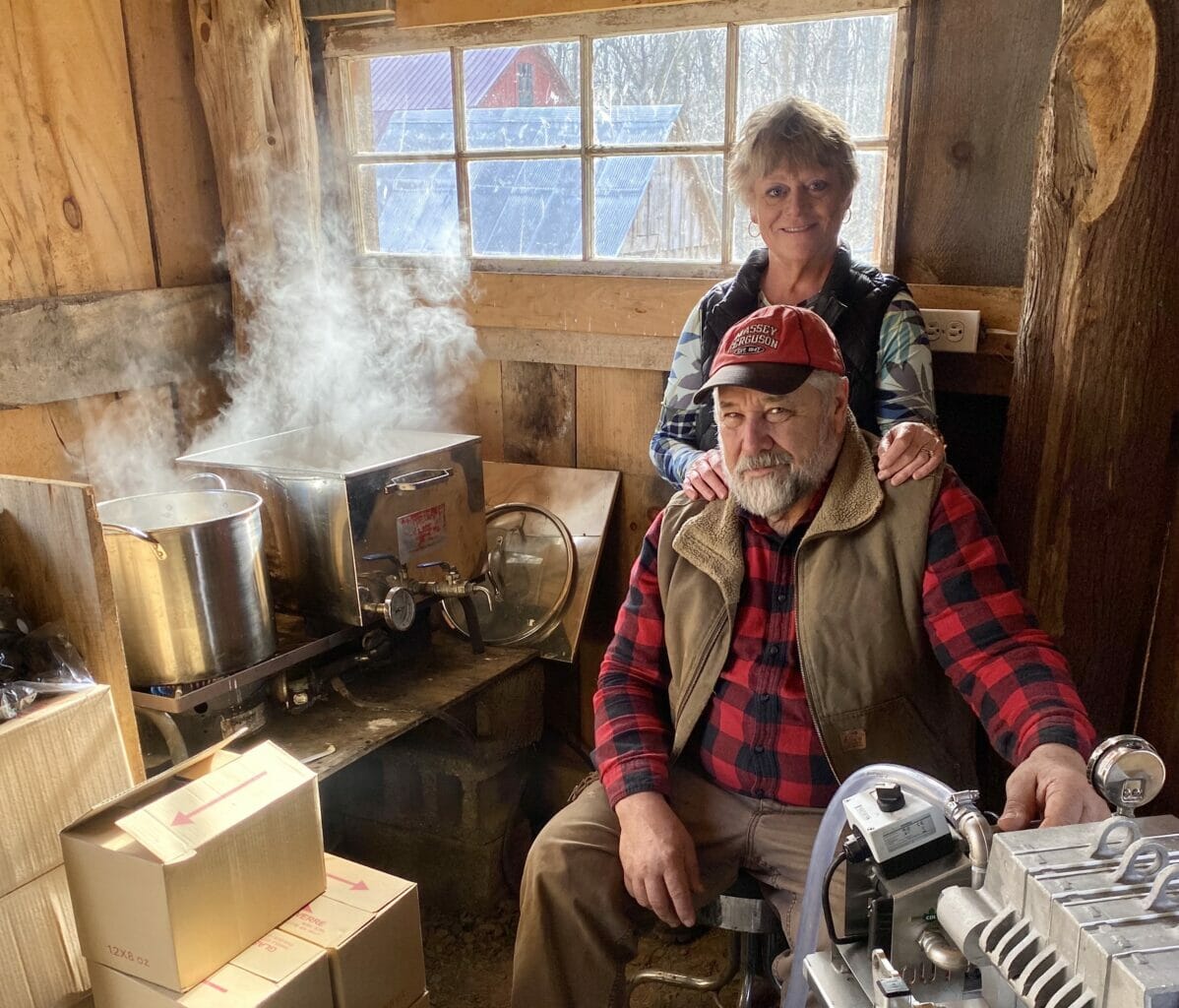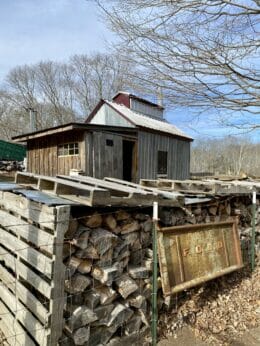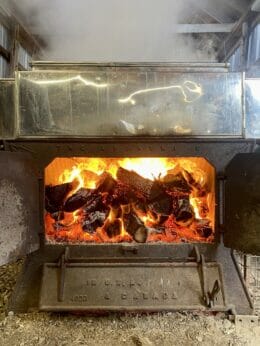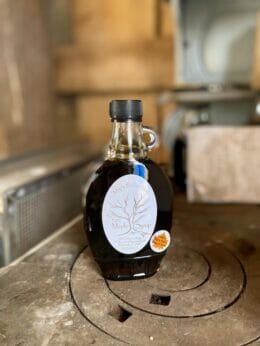For US Maple Syrup Producers, Climate Change and Competition Threaten a Way of Life
As sap season grows shorter and warmer, New England’s sugarmakers are grappling with the implications for the region’s industry and identity.
For US Maple Syrup Producers, Climate Change and Competition Threaten a Way of Life
As sap season grows shorter and warmer, New England’s sugarmakers are grappling with the implications for the region’s industry and identity.

John and Bonnie Hall in their sugar shack.by Elena Valeriote
“Sap season is over,” John Hall declared on March 4, 2023. At Maple Breeze Farm in Westbrook, Connecticut, the fleeting period in which weather conditions allow a maple tree to be tapped for sap had ended twenty-three days earlier than the previous year and ran about two weeks shorter.
For most of the world, sap season comes and goes as invisibly as the sap that flows beneath a tree’s bark. For Hall, whose family has been producing syrup from the woods on this plot of land since 1635, his wife Bonnie and other farmers in the Northeastern United States and Eastern Canada, this transition between winter and spring is a season in its own right.
Very little about the process of sugaring (harvesting sap from maple trees) on Maple Breeze Farm has changed in the last four centuries, but this season the Halls are facing unprecedented challenges as a result of global changes in weather patterns and the marketplace.
“Sugaring is very weather dependent,” explains Hall. “And this year, we didn’t have any winter.”
Just a few degrees makes all the difference—too many warm days in February and there will be less maple syrup for all the months to follow.
The winter season spanning 2022-2023 was the warmest on record for Connecticut, according to the National Oceanic and Atmospheric Administration. Using information provided by the Northeast Regional Climate Center, the NOAA reported the average regional temperature for the season as 31.9 degrees Fahrenheit, 5.2 degrees warmer than normal.
For the Halls, the consequences of this warm winter are immediately evident in the minimal yield from this sap season: less than forty gallons of maple syrup, about half of last year’s seventy-four gallons.

As the climate changes, pushing ideal sugaring conditions to the north and threatening maple syrup production in the region, having diversified sources of income bolsters the long-term financial sustainability of farms such as Maple Breeze.
A recent Frontiers survey of more than 100 American maple syrup producers (more than half based in New England) reported that only 12% declared maple sales as their primary source of income; for nearly half of participants, maple sales account for no more than 5% of annual income. The Halls’ primary revenue, for example, comes from other agricultural ventures, including sales of pork, beef, lamb and eggs from animals raised on their farm.
At the scale of a single farm, the impact of slightly warmer weather may seem small, but for the U.S., which valued the production of maple syrup in 2021 at $134 million, the movement of a great portion of this industry across the Canadian border would be a substantial economic loss.
Whether or not the livelihood of farmers like John and Bonnie depends on maple syrup, sugaring is an integral part of New England culture and plays a role in the local economy not only as an agricultural good but as a driver of regional tourism. Of those surveyed by Frontiers, 86% said that maple products are an important component of local tourism.
The Maple Syrup Producers of Connecticut Association hosts Maple Weekend each year. On these two days, residents and travelers alike are invited to visit sugar shacks throughout the state to see how maple syrup is made and to buy maple products. This year’s Maple Weekend was scheduled for March 18 and 19th—two full weeks after sap season had finished for most producers. As weather patterns change, it may become harder to connect agricultural events with tourist attractions, impacting the economic stability of both sectors.
During sap season, when there is a briefly perfect balance of freezing nights and cool days, the Halls have about a thousand taps (spouts that act as a funnel from which the sap flows) in maple trees ranging from twenty-five to four hundred years old. To avoid overstressing their trees, the Halls tap just once each season and work according to natural cycles. Part of this means continuing traditional sugaring practices that originated with the Indigenous populations of North America, rather than transitioning to the use of modern tools that would expedite the process.
“We’re not into the latest technology,” says Hall, who points to images in a farmers catalog of machines that quickly vacuum sap from trees. “All of our sap runs out of the tree with gravity.”
About fifty gallons of sap are needed to make just one gallon of pure maple syrup. Although some producers have switched to gasoline-fueled machinery, the Halls boil their sap over fire as their family has done for generations, using wood from trees that have fallen on their farm. As the sap boils, the liquid condenses and takes on a darker hue.

The syrup is labeled for sale in accordance with a standardized grading system based on color, ranging from Golden to Amber to Dark to Very Dark. Every bottle of Maple Breeze Farm syrup is graded Dark. “The darker you go, the stronger the maple flavor is,” says Hall. A spoonful of the Halls’ syrup is a testament to this fact—it is as rich in flavor as it is in color, not only sweet but slightly earthy, redolent of the soil and bark from which it came.
Maple Breeze Farm products are available for purchase only at nearby farmers markets or from their farmstand, as is often the case with artisanal maple producers, who do not generate the quantity necessary to stock supermarket shelves. Additionally, face-to-face interactions offer a chance to explain not only what makes their syrup special but also why it may seem expensive compared to others.
At more than a dollar an ounce, Maple Breeze Farm syrup still does not fully reflect the amount of labor distilled into each bottle and the cost of materials, which has skyrocketed since the start of the pandemic and the subsequent supply chain crisis. “We’re not in it for the money,” says Bonnie Hall. “I don’t think we sell anything for a profit.”
Commercial producers in places such as Vermont and Quebec are able to drive down the price of syrup while increasing their profit margin by packaging it for wholesale and sourcing from many different farms.
When it comes to branding maple syrup from numerous farms under one label, Bonnie comments, “It’s not illegal, but to us it’s immoral. Our syrup has our name on it. It’s our trees. It’s our story.”

In some ways, it is this close connection with maple trees and the sugaring tradition that is most at risk for New Englanders. For the trees and the traditions to be preserved for generations to come, action must be taken at the individual and industry levels with consideration for environmental, economic and social sustainability.
Farmers like John and Bonnie are doing their best on the frontlines of climate change to care for their land, while also participating in politics to influence decisions that affect local ecosystems. As the situation grows more dire, institutions in the area are starting to lend their support by investing resources into innovative opportunities. The Forest School at the Yale School of the Environment launched the Maple Education and Extension Program last year with the specific intention to help New England’s maple syrup makers develop more sustainable production methods and adapt to the effects of climate change.
For the Halls and other farmers in the Northeast, the future will depend, as always, on continuing a careful conversation with their trees and their community.
Follow us
This work is licensed under a Creative Commons Attribution-NoDerivatives 4.0 International License.
Want to republish a Modern Farmer story?
We are happy for Modern Farmer stories to be shared, and encourage you to republish our articles for your audience. When doing so, we ask that you follow these guidelines:
Please credit us and our writers
For the author byline, please use “Author Name, Modern Farmer.” At the top of our stories, if on the web, please include this text and link: “This story was originally published by Modern Farmer.”
Please make sure to include a link back to either our home page or the article URL.
At the bottom of the story, please include the following text:
“Modern Farmer is a nonprofit initiative dedicated to raising awareness and catalyzing action at the intersection of food, agriculture, and society. Read more at <link>Modern Farmer</link>.”
Use our widget
We’d like to be able to track our stories, so we ask that if you republish our content, you do so using our widget (located on the left hand side of the article). The HTML code has a built-in tracker that tells us the data and domain where the story was published, as well as view counts.
Check the image requirements
It’s your responsibility to confirm you're licensed to republish images in our articles. Some images, such as those from commercial providers, don't allow their images to be republished without permission or payment. Copyright terms are generally listed in the image caption and attribution. You are welcome to omit our images or substitute with your own. Charts and interactive graphics follow the same rules.
Don’t change too much. Or, ask us first.
Articles must be republished in their entirety. It’s okay to change references to time (“today” to “yesterday”) or location (“Iowa City, IA” to “here”). But please keep everything else the same.
If you feel strongly that a more material edit needs to be made, get in touch with us at [email protected]. We’re happy to discuss it with the original author, but we must have prior approval for changes before publication.
Special cases
Extracts. You may run the first few lines or paragraphs of the article and then say: “Read the full article at Modern Farmer” with a link back to the original article.
Quotes. You may quote authors provided you include a link back to the article URL.
Translations. These require writer approval. To inquire about translation of a Modern Farmer article, contact us at [email protected]
Signed consent / copyright release forms. These are not required, provided you are following these guidelines.
Print. Articles can be republished in print under these same rules, with the exception that you do not need to include the links.
Tag us
When sharing the story on social media, please tag us using the following: - Twitter (@ModFarm) - Facebook (@ModernFarmerMedia) - Instagram (@modfarm)
Use our content respectfully
Modern Farmer is a nonprofit and as such we share our content for free and in good faith in order to reach new audiences. Respectfully,
No selling ads against our stories. It’s okay to put our stories on pages with ads.
Don’t republish our material wholesale, or automatically; you need to select stories to be republished individually.
You have no rights to sell, license, syndicate, or otherwise represent yourself as the authorized owner of our material to any third parties. This means that you cannot actively publish or submit our work for syndication to third party platforms or apps like Apple News or Google News. We understand that publishers cannot fully control when certain third parties automatically summarize or crawl content from publishers’ own sites.
Keep in touch
We want to hear from you if you love Modern Farmer content, have a collaboration idea, or anything else to share. As a nonprofit outlet, we work in service of our community and are always open to comments, feedback, and ideas. Contact us at [email protected].by Elena Valeriote, Modern Farmer
April 11, 2023
Modern Farmer Weekly
Solutions Hub
Innovations, ideas and inspiration. Actionable solutions for a resilient food system.
ExploreExplore other topics
Share With Us
We want to hear from Modern Farmer readers who have thoughtful commentary, actionable solutions, or helpful ideas to share.
SubmitNecessary cookies are absolutely essential for the website to function properly. This category only includes cookies that ensures basic functionalities and security features of the website. These cookies do not store any personal information.
Any cookies that may not be particularly necessary for the website to function and are used specifically to collect user personal data via analytics, ads, other embedded contents are termed as non-necessary cookies.
Describing a maple season through a small producer in a state that produces very little syrup, is simply bad reporting. Our sugar house in New Hampshire had its second best season ever. Syrup production in the US and Canada continues its upward trend each year as it has done since the 1970s. Please do some research before writing a narrow, misleading article.
Another misleading climate change article. Also, nobody boils using gasoline. We had our second best season ever.
Climate change has created extreme weather conditions, affecting agricultural production around the world.